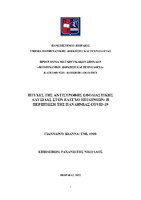Πτυχές της αντίστροφης εφοδιαστικής αλυσίδας στον έλεγχο επιδημιών: η περίπτωση της πανδημίας COVID-19
Aspects of reverse logistics supply chain in epidemic control: the case of COVID-19 pandemic

View/
Keywords
Αντίστροφη εφοδιαστική αλυσίδα ; COVID-19Abstract
The aim of this thesis is to examine aspects of reverse logistics in epidemics control, focusing on the COVID-19 pandemic. In general, the emergence of an epidemic can pose a significant threat for humans on a global basis, creating the urgent need for immediate decision-making and implementation of interventions to contain its spread. With the recent COVID-19 pandemic and in order to contain it, the large-scale use of personal protective equipment, such as masks and gloves, was required not only in a hospital environment but in the work and domestic environment too. The massive use of protective equipment has led not only to shortages in production and inability to manage its supply chain but also to an increase in the production rate of medical waste. Establishing an effective network of reverse logistics to manage virus-infected equipment can significantly help to reduce the spread of the virus and avoid the creation of new outbreaks of the infection. Several studies have been published, especially during 2020, on the proper management practices regarding this equipment after the end of its life cycle, including sterilization and re-use, but unfortunately only a few countries have applied them. This thesis reports and examines some of these practices by highlighting the challenges of reverse logistics for this kind of equipment and pointing out the need to invest in research and to adopt effective strategies to contain epidemics at global level.


